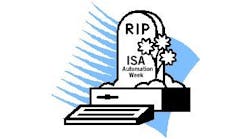I submitted a paper on concepts and high-level implementation of predictive maintenance. It went something like this: Any user company can save a bunch of money using this approach. If I followed the "recommended" oil-change frequency to change my car's oil, I would spend $1,400 over the life of the car. The car, however, knows when the oil needs changing. If I listen to it, I would spend $400 over its life. Listen to your assets.
The Malaysian engineer who followed my presentation validated my high-level approach and explanations. I felt good about the research and implementation of my paper.
The audience paid to attend the conference, so they were there because they wanted to be. And there were just as many people in the room as there were in my previous 15 years of giving papers and presentations at an ISA conference.
In those years, even though attendees had to pay for the conference, they did not have to pay to see the exhibits. The "show" attracted a lot of tire kickers, and the floor was packed with big booths and funky products, and games to lure people in.
This year's exhibit, in Orlando at the end of September, took less than 5 minutes to walk.
So which of the big automation suppliers were there? Like none. The reason for this is that as Rockwell now has its Automation Fair, many other vendors have user group meetings and conferences.
ISA Automation Week has shrunk to a level almost smaller than regional tabletop shows.
A feature that started some time ago is poster sessions. These are presentations on topics that the non-paying attendees can enjoy and learn from. They were on the floor as well, yet the seats were empty. If I am going to pay to attend, I will go to the technical sessions to get my money's worth.
One of the reasons industry people went to these gatherings was to network and see people once or twice a year who you wouldn't otherwise see. That doesn't happen anymore because most of these people don't attend. There was a press room, but it was empty. No buzz.
ISA as an organization, like all others, has to grow and adapt with the times. That time is now. They have missed the boat with the discrete part of the automation industry, continue to use outdated mentalities, and focus on past behaviors.
This isn't a white shirt and tie industry anymore. It is business casual and a golf shirt.
In the 1990s, Richard Simpson, then of ISA, created an approach called ISA Tech. The exhibits were open in the afternoon, and the technical sessions were in the morning. I can't remember if the attendees had to pay, but for me it was a roaring success.
I had organized a session with Dick Morley, Rich Ryan of Rockwell Software, and a few others. There were more than 300 people in the room; the doors were open, and more people were in the hallway. Wow, I thought, this is cool.
The function of technical sessions and organizations is to reach out to people, educate and promote the goodness of our industry. ISA Tech did that.
That's why I feel ISA needs to stop being the process-focused, one-show organization, and support local chapters and put together mobile tech programs for its audience. Make it something like ISA Tech, but charge for the privilege of attending.
My presentation was the same quality as it has always been, whether attendees paid or not. Paying doesn't increase the quality of the presentations, but increases the perceived value of what the attendee is getting. It doesn't have to be much, but something.
If ISA Toronto wanted to put on a conference on SCADA, for instance, ISA HQ should help it implement. If the ivory tower decides to focus on wireless technologies this year, then organize it. People don't have to travel in this day and age, so use webcasts, etc.
I'd miss the opportunities to network and mingle with the people who have become friends over the years, but the concept of a single show, at a single time, is past its prime.






